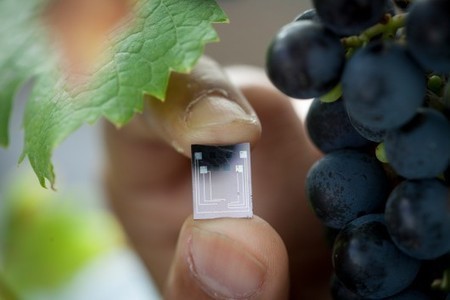
Robohub.org
Tiny, cheap water-sensing chip outperforms larger, pricier sensors | Gizmag
“…a team from Cornell University has created a water-sensing silicon chip that’s not only tiny, but is also reportedly ‘a hundred times more sensitive than current devices.’ What’s more, the chips might be possible to mass-produce for just $5 a pop. … the chip contains a tiny water-filled cavity. Once placed in soil, inserted in the stem of a plant, stuck in a cement matrix or put somewhere else, the chip exchanges moisture from that cavity with moisture in its environment via a nanoporous membrane. The chip measures any changes in the pressure within the cavity, that result from water either entering it or being drawn out.”
See on www.gizmag.com
John Payne
Related posts :
Developing an optical tactile sensor for tracking head motion during radiotherapy: an interview with Bhoomika Gandhi
Ella Scallan
05 Mar 2026
Bhoomika Gandhi discusses her work on an optical sensor for medical robotics applications.
Humanoid home robots are on the market – but do we really want them?
The Conversation
03 Mar 2026
Last year, Norwegian-US tech company 1X announced “the world’s first consumer-ready humanoid robot designed to transform life at home”.
Robot Talk Episode 146 – Embodied AI on the ISS, with Jamie Palmer
Robot Talk
27 Feb 2026
In the latest episode of the Robot Talk podcast, Claire chatted to Jamie Palmer from Icarus Robotics about building a robotic labour force to perform routine and risky tasks in orbit.
I developed an app that uses drone footage to track plastic litter on beaches
The Conversation
26 Feb 2026
Plastic pollution is one of those problems everyone can see, yet few know how to tackle it effectively.
Translating music into light and motion with robots
University of Waterloo
25 Feb 2026
Robots the size of a soccer ball create new visual art by trailing light that represents the “emotional essence” of music
Robot Talk Episode 145 – Robotics and automation in manufacturing, with Agata Suwala
Robot Talk
20 Feb 2026
In the latest episode of the Robot Talk podcast, Claire chatted to Agata Suwala from the Manufacturing Technology Centre about leveraging robotics to make manufacturing systems more sustainable.
Reversible, detachable robotic hand redefines dexterity
EPFL
19 Feb 2026
A robotic hand developed at EPFL has dual-thumbed, reversible-palm design that can detach from its robotic ‘arm’ to reach and grasp multiple objects.
“Robot, make me a chair”
MIT News
17 Feb 2026
An AI-driven system lets users design and build simple, multicomponent objects by describing them with words.




